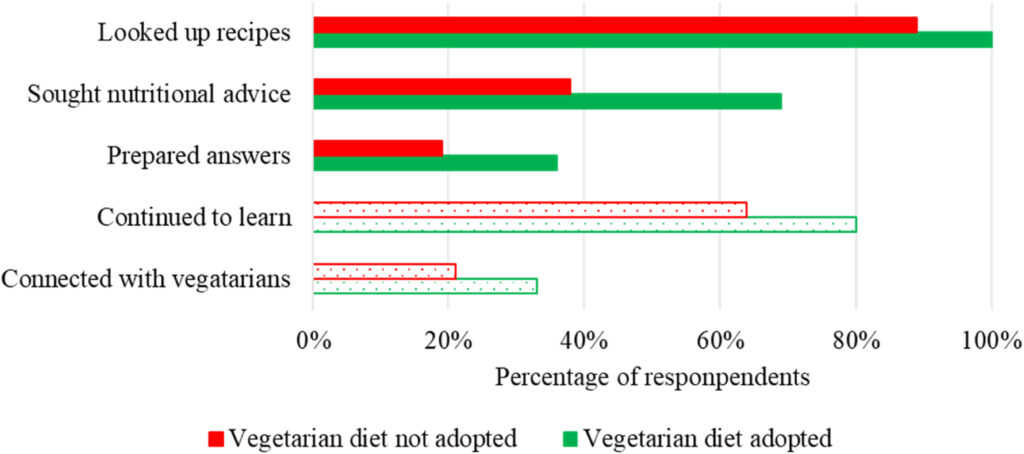
Many people say they care about the planet and animals, yet still eat meat. A new study explains why.
Are you a meat-eater who loves the environment and the animals? You’re not alone. In the UK, nearly half of the respondents to a 2020 survey said they felt hypocritical for doing so.
There’s a good reason for this: caring about the planet and its creatures rarely leads to people cutting out meat, according to a new study published in the Appetite journal.
The real driver of dietary change? Cognitive dissonance, or the psychological discomfort people feel when their behaviours (in this case, meat consumption) don’t align with their values (caring for animals and the planet). When they can no longer justify this action-intention gap, they end up lowering their meat intake, the authors suggest.
Others use a range of strategies to rationalise their continued meat consumption. They often state that humans evolved to eat meat, that eating meat is normal because most people do it, that it is necessary for health, or that it tastes good.
“Some individuals may also dissociate meat from its animal origins to further reduce the psychological discomfort,” the study states. “Individuals who have progressed through the stages of change are more likely to resolve cognitive dissonance by reducing their meat consumption.”
Cognitive dissonance drives people to give up meat

The study involved nearly 600 participants from the US and Australia, two of the heaviest meat consumers in the world. As expected, people who had no intention to change their diets felt the benefits of a plant-based diet were low, while those who were already vegetarian reported the highest perceived advantages.
Awareness of the downsides of factory farming followed a similar pattern, with people intending to change their diets more knowledgeable than those who were not, though less so than vegetarians.
Respondents with no plans to alter their eating patterns were the most influenced by various barriers, including health and feasibility concerns of meat reduction, and the idea that eating meat is morally acceptable. In addition, they ate meat more frequently than those intending to adopt a vegetarian diet.
In a follow-up survey conducted six months later, 20% said they adopted a vegetarian diet and continued to follow it. These participants’ cognitive dissonance significantly increased, while their perceived barriers of health and feasibility fell. Further, they reported much greater support from partners and friends than those who did not give up meat.
“Simply informing consumers about the benefits of plant-based diets may be insufficient to change their food choices,” the researchers found. And once individuals do decide to reduce their meat intake, practical constraints like “the availability of plant-based options, cooking skills, and cost” become particularly relevant.
‘We need to go beyond raising awareness’

“Health-related barriers significantly decreased among individuals who successfully transitioned to a vegetarian diet, reflecting the physiological challenges that can arise during this shift. These challenges include hunger, fatigue, digestive discomfort, and potential nutrient deficiencies in iron, vitamin B12, and protein,” the study states.
Those who followed through with their intention to go vegetarian were a lot more likely to seek nutritional advice, exhibiting how these health concerns can be alleviated with proper planning.
Moreover, the researchers found that looking up meat-free recipes online and preparing answers for social situations where participants’ choices may be questioned were also important actions that support the dietary transition.
They noted that policy interventions and consumer-focused strategies could help reduce barriers and trigger cognitive dissonance: “Policymakers can help mitigate feasibility barriers, such as limited availability and higher costs.”
Meat alternatives are more expensive than conventional animal proteins, but if both categories’ prices reflected their cost on the environment, their prices would be at parity. “Meat taxes, therefore, present a viable policy tool for encouraging plant-based diets without disproportionately affecting low-income households,” the study states.
Promoting plant-based education via integrating vegan meal preparation into culinary school courses is another useful measure. Restaurant associations, meanwhile, can incentivise chefs to create plant-forward menus through awards, while the media can feature more vegetarian dishes in popular cooking shows.
“Shifting to a plant-based diet is tough when meat is convenient, tasty, and socially accepted. That’s why practical support – like nutrition guidance, simple recipes, and a supportive community – matters so much,” said co-author Sebastian Inbanner. “Our takeaway: To encourage sustainable eating, we need to go beyond raising awareness. We want to help people navigate the discomfort and make plant-based options easy, appealing, and normal.”
The post People Who Care About Animals & the Planet Still Eat Meat. Why? appeared first on Green Queen.
This post was originally published on Green Queen.